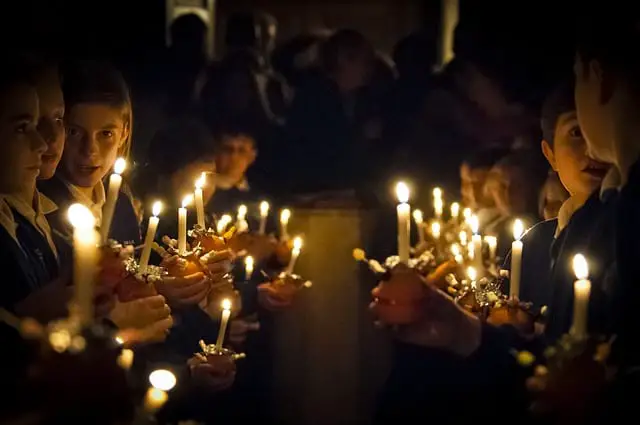Has your child seen child extras on TV or at the cinema and told you they want to do that too? It may be possible, but involves a lot of lucky timing. We look at how to become a child extra for TV and film in the UK.
Agencies for Child Extras
You can find a list of reputable agencies who represent children for background roles in our Reputable Child Extras Agencies page.
What Do Child Extras Do?
Child extras are supporting artists in films, TV programmes, and commercials. They form part of the setting in which the main action is to take place. They are usually dressed by the wardrobe team and will be told on the day what to do when the cameras are rolling.
All production companies must arrange a child licence for each child taking part, and provide a paid licensed chaperone. This means they only put children into the film set if they are absolutely essential to the scene. On the other hand, the camera is likely to rest on each child a second or two longer than for adult extras, because the children were there for a reason.
Child extras are normally aged 9 and over so that the licensed children can work longer hours. After the age of 13, paid child extra work disappears. Production companies will usually prefer young looking older teenagers who do not need licences; this point is reached on the last Friday of June following their 16th birthday.
Do Child Extras Get Paid?
Child extras receive a small daily payment for each day of work, and agencies will deduct a percentage commission fee. Usually, this is 20-25% of the child’s earnings including any payment made for the wardrobe fitting. Parents are expected to bear the costs of travel and their own loss of earnings if they are transporting the child to the film set instead of working. Child extra work will not make you or your child wealthy.
Child extras will not normally receive a credit in the IMDb listing. Parents are able to add them as uncredited appearances if they wish, but following the IMDb guidelines.
Child extra work is very unlikely to lead to paid acting work on its own. They are two different forms of performance. However, most children enjoy their time on set and it will give them happy memories for years to come.
For many children, great pleasure comes when they see themselves on screen.
What Are The Downsides For Child Extras?
Filming is boring. For children entering the glamour and excitement of a film set for the first time, this can come as a shock. The wardrobe call involves lots of people fussing about each child and the excitement of wearing the most exciting outfit ever. Then comes the reality of standing about on one spot for an hour or two while men and women fiddling with equipment make everyone wait. The crew works hard to perfect each take, but children have no idea why they are waiting. That can be particularly challenging when standing in a windy field on a cold day.
Child extras are as disposable for production companies as their adult counterparts are. Your child’s booking might be cancelled by phone or email the day before filming; and, less importantly, no payment will be made. This cancellation is hard for an excited child to take in. And they will notice the whole family is disappointed too. You, therefore, need to prepare your child that this is a real possibility.
Many filmed scenes will be drastically reduced or cut out completely from every production. You may sit at the cinema and discover your child never appears. It is upsetting and humiliating for the child involved. Again, you must prepare your child that this may happen.
How Do Child Extras Get Their Work?
Production companies and casting directors will work with their preferred extras agency for the location in which filming is taking place. Sometimes the agency will advertise if they need a specific look or location; but mostly they will submit children already on their books. The children should normally live within an hour’s travel of the film set. In practice, this means most child extras live in or near to London.
Unless they have an online calendar which they expect clients to keep up to date, the agency will check if your child is free on the specified filming dates. Available parents must respond quickly; the agency may complete submissions within hours.
Casting directors will choose the child extras from the submitted photos. Castings and audition workshops are rare. For many families, this is a positive benefit. On the downside, your child’s photo will have to be more eye-catching than everyone else’s. Sometimes casting teams prefer professional photographs; sometimes they don’t. The casting team will be reviewing hundreds of submissions.
So Why Do Child Extras Need A Lot Of Luck To Get Each Job?
- Your child needs to live in the area where the filming is to take place
- The agency chosen by the production team must be the one representing your child
- You need to see your agency’s availability check and respond quickly
- The filming dates must be free for your child and the adult who will drop and collect them
- Your child’s picture needs to show that they meet the essential physical criteria for that scene
- There will be a huge pile of pictures and your child must stand out
- Your child’s measurements should present no problems for the wardrobe team
- The school must agree to time off for filming and send written authorisation quickly
- Your local Licensing Officer needs to process the license quickly
- The licence application must not arrive just as your Licensing Officer goes on their annual holiday
- Scheduling, financing, and creative plans cut a lot of scenes just before filming
- The completed film might cut your child’s presence or their whole scene
In many ways, this is not as hard, expensive and onerous as the casting process for better-paid performance work. But your child’s chances of being picked, doing the filming and being shown in the final cut is extremely small. As long as you and your child are aware of this, it can be a fun activity to aim for.


